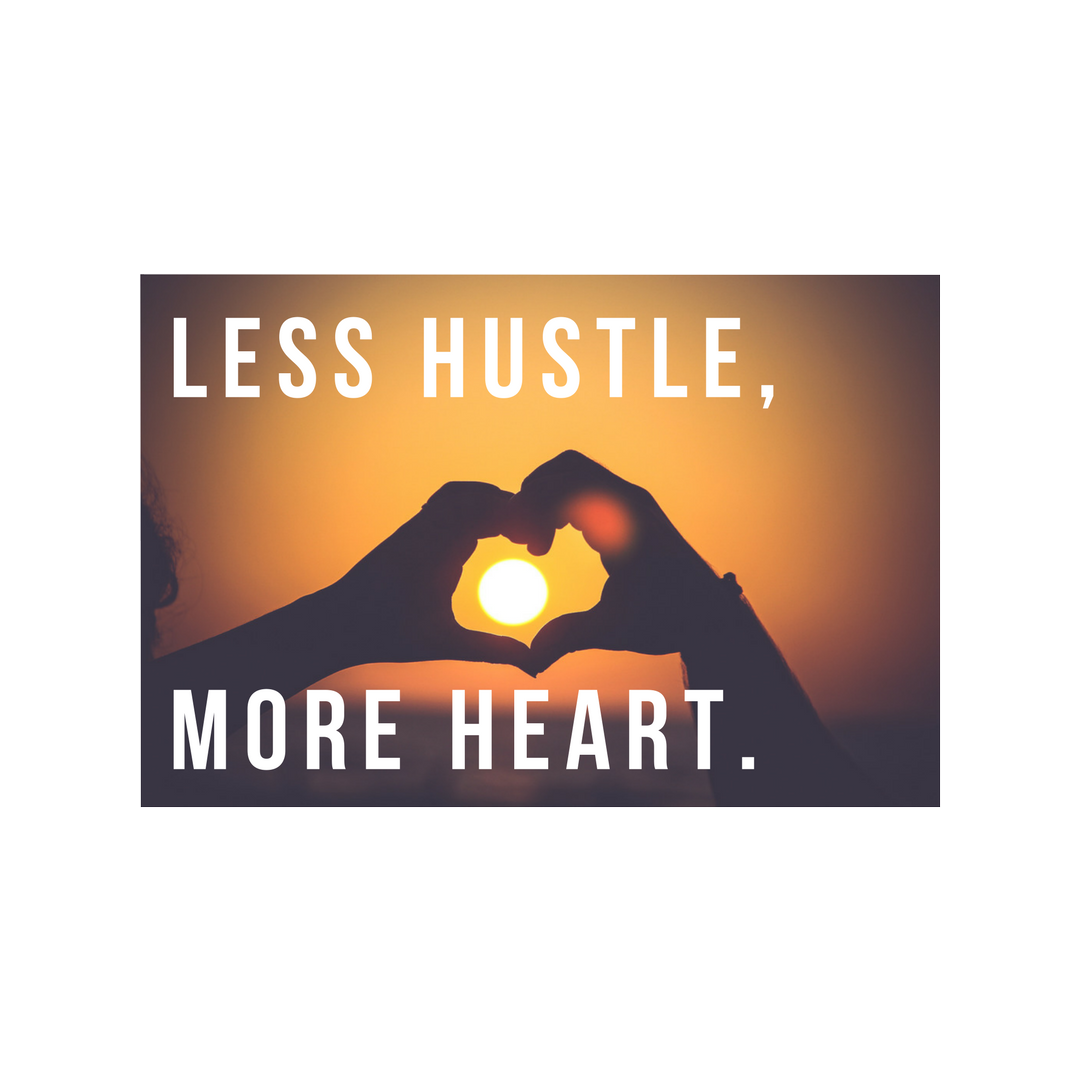There’s a narrative and paradigm currently dominating social media and thus, our psyches, that says money is the measure of success.
The focus on who you are actually are as a person, with or without things, isn’t the main message. Even though that’s what truly measures personal success for ourselves and with others and provides lasting happiness.
Instead, the focus is on feeling lack and filling that void with more instead of less to find your true value and worth.
Even some of the greatest “thought leaders” of our time prey on the basic human need to survive. It’s embedded in all the marketing language, cleverly manipulating that emotional trigger in all of us that constantly wonders and worries about everything from our next meal to our next relationship and next mortgage payment.
We’re worrying drones, no matter how much we actually already have.
I haven’t had a cable bill for 17 years but it wasn’t until I gave away my
television in 2015 that I realized how much we’re barraged with media
messaging day and night. We’re pitched fancy yet unnecessary devices and things
like insulated water bottles and airplants, catapulting legitimate needs
to connect to other humans, drink water and co-exist with nature to wants
that find 70% of Americans buried up to their eyeballs in credit card
debt and 57% of Americans with less than $1000 in their savings account. I bought into the ads, by the way, but my bank accounts are in better shape than most peoples’ apparently! I do own three fancy water bottles. My airplants didn’t last as long as my hardier plants.
Underneath all the marketing is the explicit and implicit message: you aren’t ok the way you are and you need certain things to be ok so you need more money to buy more things to furnish your expensive apartment(s) in gentrified neighborhoods to take pictures wearing the perfect outfits that you bought with all the money you made hustling to appear more successful to be more valuable and likeable. Socality Barbie captured this perfectly on her Instagram account.
And you’re hustling so hard you don’t even have time to enjoy any of this. You cultivate the look of the life they sell in the ads but don’t get to actually live it.
But you need to hustle. Because hustling wins respect and admiration. But who says hustling is really what’s required? When did that narrative begin and who authored it? Who keeps authoring it? Who’s behind the companies and “brands” that keep you burning the candle at both ends but feeling emptier despite your best efforts?
Maybe because burning yourself out maybe eases your conscience or somehow erases the guilt you have for the immense privilege you’ve been granted in our society?
Because it truly IS a privilege to hustle so hard to acquire and display material possessions to impress the Joneses. Those who actually have to hustle hard to keep a room over their heads or feed themselves would probably choose to not have to. I can speak from experience, coming from food-stamp origins and realizing the burden of extreme wealth mostly from the sidelines of my clients’ lives.
The current patriarchal paradigm oversimplifies complex conversations around privilege and power and identity politics and urges people toward endless struggle striving to have something that, for most of them, is actually an undesired goal. Depending on you are, of course.
Because the truth is, no matter how much you have, without gratitude and humility and self-confidence, it will never feel like enough. And the more you have, the greater the burden becomes to perpetuate it to prove yourself and no amount of wealth, fame or material possessions neither solidifies peace of mind nor prevents illness, disease or death. Steve Jobs, for one, taught us that. We focus on his climb and success but don’t hear as much how he regretted it all in his final days.
Instead, seek to learn how to earn what you need and love what you have.
But hustle is what we’re encouraged to do. We’re told to grind away today to garner that which we want to hold tomorrow.
So, where’s all that hustle getting us? With less money and more need to have it to hold and less overall happiness. All that wanting leaves us very little time to be grateful for what we’ve got.
So consider rejecting the current patriarchy paradigm that we’ve all internalized to the point where we barely recognize it for what it is and what’s it done to us all. For as nicely as it’s worded by mostly white men (and women) who came from tremendous amounts of privilege, it’s all the same story.
Many of them fail to mention the substantial head
starts that allowed their success. They want you to believe they had to work for what they got so you buy their book and make them richer for selling you a small part of the story of a certain kind of success, regurgitating stories of other
white men who got wealthy by hustling, too. Anyone else hip to that trend?
It actually is just more of the same power-hungry, locker room machinations of masculinity. The patriarchy says Power is the measure of manhood. And money equals power. If you’re broke, you’re weak. And weakness is failed masculinity which equals…shame.
So, it’s no wonder society is having such a hard time surrendering power to the other end of the gender binary (femininity) let alone all the many lovely identities which lie along the sexual identity spectrum. See the Kinsey Scale for more on this.
Some try to craftily slide in that amassing wealth is a demonstration of
character. But the kind of wealth that delivers the character that truly
matters is found in building lasting relationships and
cultivating self-compassion and kindness for other people. This isn’t
the mainstream message because it isn’t the life experience lesson they can provide. That kind of work happens for those without the buffer of profound privilege.
I began to realize this when my wealthy clients came to me, the middle-class transgender health coach, to help them reduce their waistlines and stress, figure out who they hell they really were and find their true purpose in life. Apparently money and things didn’t fix or fill that hole in their soul. But it makes sense because according to Maslow’s hierarchy of needs, once you have all the basics of food, water and shelter all that’s left to achieve is true adult maturity which includes actualizing your life purpose. Isn’t it interesting that most adults never mature emotionally past the age of 18? Most of the best and wisest leaders say that the route toward personal freedom is having less and being completely happy, anyway.
For that reason, I feel relieved to never quite qualify to belong among the “thought leaders” who incessantly implore us to “hustle” and “grind” to make more money to actualize true confidence and fulfillment of one’s purpose. I’ve found mine way outside the lines of what society deems normal or even legitimate. If normal looks like the heteronormative identities currently fighting over how to show basic respect to one another and feed themselves well and get enough sleep, losing the “normal” game looks and feel a lot like winning at life for yourself.
Reject their tired old patriarchy ideals as the dominant paradigm, pursuing purpose by striving to acquire more instead of learning how to be a better person more often.
I’m done internalizing that tired old story and maybe you are, too.
Embrace a narrative of less hustle, more heart that helps you discover what it means to have what you need to be happy.


